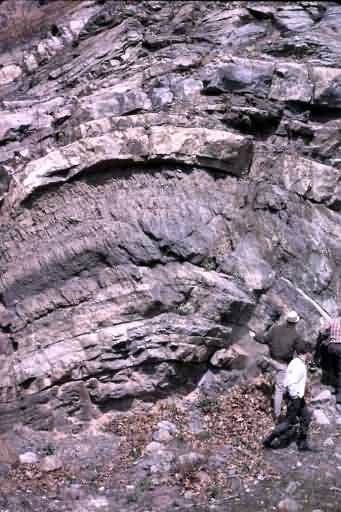
Anticline
GEOL.5200/GEOL.5220L
|
|
Structural
Geology GEOL.5200/GEOL.5220L |
| Course Home | Syllabus | Schedule | Supplemental Materials | Links |
|
Syllabus |
Course Description: Structural geology deals with the response of earth materials to applied stress. As is usually the case in the geosciences, we do not know the applied stress but rather try to infer the stress field from features in the rocks. Any given rock unit may have undergone multiple periods of deformation, a delightful complication. Additionally the principles of structural geology are used to reconstruct the subsurface geometry of rock units. In this course we will develop the tools needed to undertake these tasks. Communication: For all class-related e-mails I will use your UMass Lowell Student e-mail account. Such e-mails may include, but are not limited to, change in homework assignments and due dates, changes in exam dates, changes in class schedule, etc. It is your responsibility to monitor your UMass Lowell Student e-mail account on a regular basis. “I didn’t know because I don’t ever look at my student account” is NOT an acceptable excuse for not knowing about important changes in the course. General Course Information: Attendance is mandatory for this course. Except in the case of personal illness or a death in the immediate family, the student MUST seek prior approval from the instructor for a class absence. Ski trips, hunting trips, extended weekends, an exam in another course, etc. are NOT legitimate excuses for a class absence. Any special pleading must be done before the missed class, not after. Any un-excused absence will result in a grade of zero being recorded for missed material (including exams). Homework problems will be assigned on a weekly basis and completion of these problems is essential in order to understand the material. Academic Integrity: The student's attention is called to the definitions and regulations regarding cheating and plagiarism. The instructor shall assign a grade of zero to any portion of an exam on which he determines cheating has occurred. Likewise a grade of zero will be assigned to any portion of a laboratory exercise or homework problem that has been plagiarized. The class is not a mecca for social media. Cell phones, iPhones, and any other type of electronic communication device are not to be used during class. The only exception is if you are using the device to look-up information directly related to the classroom activity. Course Structure:
The course comprises two components: a lecture block and a lecture/lab block. One or two hours a week will be devoted to a traditional lecture setting. During these times we will also discuss assigned problems and there will be student presentations. The lecture/lab block will be devoted to an in-depth study of a particular aspect of structural geology. Some of these blocks will be used for outdoor mapping exercises and field trips. The laboratory and lecture parts of the course are fully integrated and the final grade will be based on the student performance in both the lecture and laboratory. Specific Course Goals:
At the conclusion of this course, students should be able to show that they have realized the following course goals:
Course Topics:
Structural geology and structural analysis Deformation Strain in rocks Stress Stress in the lithosphere Rheology Fracture and brittle deformation Joints and veins Faults Kinematics and paleostress in the brittle regime Deformation at the microscale Folds and folding Foliation and cleavage Lineations Boudinage Shear zones and mylonites Textbook: Fossen, H. (2016) Structural Geology, 2nd Ed. Cambridge University Press.
|